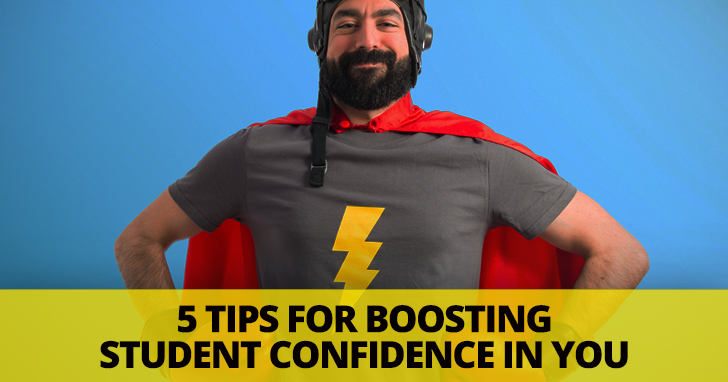Everybody Needs a Hero: 5 Tips for Boosting Student Confidence in YOU


What you do and how you present yourself as their teacher can make a big impact on how engaged they are in classroom activities and, as a result, their language learning process. And while no teacher can please every student all of the time, you can make a difference in how your students view you and how engaged they are in class when you are sure to let them know these four things.

Of course you are a qualified teacher. You wouldn’t have gotten the job if you weren’t. But it’s important for your students to know your qualifications, too. Language instruction methods are not necessarily what they have experienced in their educational past, and these methods can sometimes seem silly or pointless. When your students understand your qualifications and respect your ability to teach, these unconventional methods become more palatable and more purposeful. Make sure your school advertises that its teachers are educated and qualified to teach, either in general terms (all of our teachers are certified) or with specific teacher bios posted on their website. In addition, don’t hesitate to talk about yourself in class. That’s not to say you should lecture about yourself and your past, but in icebreaker activities or other discussions where students will be sharing personal information, talk about your education and experience. Your students will be encouraged to know your professional history as well as your educational background.
Though your education and experience will say the most about your qualifications for teaching, your students will respect the achievements that others recognize as well. Feel free to talk about or display awards you have won, professional memberships or any other outside recognition of your teaching. Some foreign language classroom teaching methods may seem strange, in particular to adult students. When your students know that others in the educational field value what you do in your classroom, they will be more willing to trust you in these nontraditional activities and engage with the learning process. In addition, if you have published research or articles, encourage your school to publicize it. Bulletin boards and websites are great avenues for this. You can also use your publications in class with the copyright and authorship information still intact. Your students will see that you can not only help them, but that you are also helping other teachers in your field. And since some of your students will go on to be English teachers in their home countries once their studies are complete, they may appreciate the sharing of resources in your classroom and the permission to use them in their own classrooms.
Your knowledge of the English language is essential for being a successful ESL teacher. Students will ask difficult questions from time to time, and you should be able to answer them. Not only that, you likely have additional knowledge that will garner respect from your students. Do not be afraid to show this knowledge in your classroom. You might do this by using the phonetic alphabet when teaching English words. You may point out common student mistakes and instruct correct language use before those mistakes come up in class. Knowledge of language’s origins will also go far to inspire respect in your students’ minds. Be careful, though, when your knowledge contradicts that which your students have been taught in the past. It is bound to happen at some point or another, and your should be able to explain why your information is truer or better than what your students have been told in the past but with kindness and patience.
Professionalism goes a long way in garnering respect from your students. Though different schools have different expectations and standards for teachers and different teachers themselves have different styles, you should give thought to how you present yourself to your students both in class and outside it. This includes the clothing you wear, how you behave in class, and your general preparedness. Be sure to arrive on time or early for class. Have your materials organized and ready to use. Make sure all necessary technology is working correctly before class, and end class on time. In addition, be aware of what may be appropriate and inappropriate for teachers where you teach and what your students will expect from you as their teacher.
The best teachers do more than cover the curriculum. They inspire confidence in their students and engage those men and women in the language learning process. When students have confidence in and respect for their teachers, the learning process is smoother and more effective.